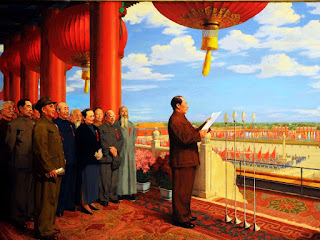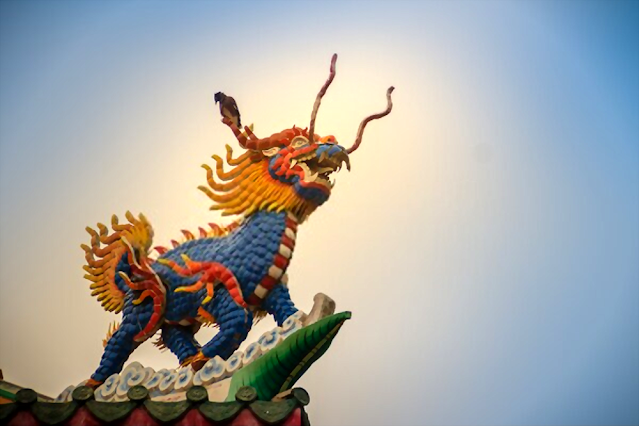Everything You Need to Know About Hungry Ghost Festival
Hungry Ghost Festival, also called Zhong Yuan Festival or Obon Festival, is one of four traditional Chinese holidays (the other three refer to Lunar New Year’s Eve, Qingming Festival, and Double Ninth Festival) for ancestor worship. It bears both the Buddhism belief and the Taoism culture. The origin of the Hungry Ghost Festival can be traced back to the worship of ancestors and other seasonal sacrifices offered in ancient times. July was an auspicious month when crops began to ripen. Mid-July was a day when people celebrate a good harvest and show gratitude to the earth and ancestors. Sacrifices like fresh rice would be offered to their ancestors as thanks to their blessings. Therefore, the Hungry Ghost Festival is about respecting the ancestors and fulfilling filial duties.
 |
| Hungry Ghost Festival |
Basic Facts about the Hungry Ghost Festival
Name: Hungry Ghost Festival, Zhongyuan Festival (中元节), Obon Festival(盂兰盆节)
Date: July 15 in northern China, July 14 in southern China
Origin: Ancestral Worship
Popular Areas: China, Southeast Asia
Traditions: worship ancestors, set lanterns on the river, burn hell money
Origin of Hungry Ghost Festival
It's said that a Ksitigarbha Bodhisattva's mother went to the underworld after death and was imprisoned to endure all kinds of torture. Being a filial daughter, Ksitigarbha Bodhisattva couldn't bear that her mother suffered so much that she ordered the ghost guard on July 15 to release her mother secretly. However, out with Ksitigarbha Bodhisattva's mother were other ghosts who swarmed out and did a lot of harm in the human world. They went back to their old family to ask for money to live a better life in the underworld and be reincarnated sooner. Therefore, people designated this day as the Ghost Festival and burn hell money to the dead.
 |
| Obon Festival |
Taoist Zhongyuan Festival Vs. Buddhist Obon Festival
Zhongyuan Festival came from Taoism. Taoists regard Jan.15th as the Shangyuan (Upper Yuan), July 15, as the Zhongyuan (Middle Yuan), and the Oct.15th as the Xiayuan (Lower Yuan). The Shangyuan day is the birthday of the Heavenly God. The Zhongyuan day is the birthday of Earth God. The Xiayuan is the birthday of the Water God. Those three Gods govern everything in the universe. Therefore, these three days are essential to Taoists.
Therefore, Taoists often pray for the lonely souls and ghosts. During the feudal ages, the local government also demanded the Taoist monks set up ashram to offer sacrifices to the spirits.
In south China, the holiday is celebrated on July 14. In the late years of the Song dynasty, a group of Mongols broke into south China in July, and the local Chinese decided to have the holiday a day earlier before they flee from their homeland.
 |
| Worshipped God |
In Buddhism, it's called the Obon Festival; an event originated from the story of “Mulian saving his mother." According to Tripitaka, Mu Lian searched for his mother a long time in the underworld before discovering a group of hungry ghosts was torturing her. He offered his mother food, which was only hijacked by the ghosts. Mu Lian had no choice but to turn to the Buddha, who was deeply touched by Mu Lian's filial piety and granted him Bon Sutra. The starving mother finally got food. To commemorate Mu Lian's deed, Buddhists hold the grand "Bon Festival" every year.
When the story was introduced to China, the Chinese surprisingly thought that they would offer sacrifices to the hungry ghosts rather than asking monks to fast. Gradually, the Odon Festival is fused with the Chinese Ghost Festival. On the day, people would offer sacrifices, worship ancestors, and the wronged ghosts nearby to hope of a peaceful life.
 |
| Monks Celebrating Obon Festival |
Ghost Month
The seventh lunar month is the "ghost month" in China. It's said that every June 30 of the lunar calendar, the Ksitigarbha Bodhisattva, who is in charge of the hell, would open the gate and release the hungry ghosts until the July 30. To secure the ghosts and humans' safety, Chinese people in old times would hold events for praying and worshiping. They believed that by praying and offering sacrifices, those ghosts would be free from their suffering and stop harassing people. People also burn hell money to bribe those ghosts. In some wealthy and influential families, theatrical troupes were invited to sing operas for the ghost, and banquets were held.
The ghost month gradually became an unlucky month. Old Chinese never held wedding ceremonies in the month. There were also a lot of taboos. For example, people weren’t allowed to wear clothes that bear their names, pat others on shoulders, whistle, and small children, and the weakling elders couldn’t go out at night. Today, many taboos seem silly and untested, but some remain inexplainable to science.
 |
| Ghost Month |
How to celebrate the Hungry Ghost Festival?
- 1. Set River Lanterns: people set floating lanterns on rivers to pray for the lonely ghosts.
- 2. Burn Paper Clothes: at night, people offered bean curd, rice, and burned incense, yellow and white clothes made of paper so that ghosts would have something to eat and wear.
 |
| Eggplant Cake |
- 3. Make Eggplant Cake: it was used as a kind food specially made for the Obon Festival.
- 4. Burn Incense: old Chinese related the offering sacrifices to the ghosts and praying for a good harvest. They often burnt incenses in front of their house and stick the incenses into the ground (similar to rice transplanting).
- 5. Worship Ancestors: people would return to their hometown and worship their ancestors at an evening of late July.
- 6. Offer Sacrifices to the Earth: people would offer sacrifices to the earth and the plants, burn paper, cut the colorful paper into strips, and tangle them on the ears of plants, protecting crops from being attacked by hail.
- 7. Set off Sky Lanterns: people believed that their problems would be taken away, and their way to heaven would be lit up by setting off sky lanterns.
 |
| Duck Meat |
- 8. Eat Cooked Duck (pronunciation of “鸭”(duck) in Chinese is the same as “压," which means keep something down): people eat cooked ducks in mid-July in the hope that this “鸭” would be like “压” to keep the ghosts down in hell.
Today, the celebration is much simpler, and many young people don’t even realize the holiday's existence. People only burn some hell money and incense or bring wreaths to memorize the deceased.
Countries that Celebrate the Hungry Ghost Festival
Thailand: on lunar July 15, the Loy Krathong Festival will be held, and Thais set off sky lanterns to pray for the dead.
Japan: the Obon Festival is held during July 13-16 in urban cities and Aug.13-16 in rural areas. Before the festival, the Japanese sweep tombs, invite their ancestors' ghosts back home on the first day, and then send them back on the last day. They also give each other gifts and gather together to perform a dance named "Penyong."
North Korea: Compared to the Zhongyuan Festival in China and Japan that focuses more on ancestral worship and praying, the Korean people maintained the original sense of celebrating the harvest.
Singapore: Besides the ancestral worship and praying part, Singaporeans have a unique activity named "Getai," a kind of platform temporarily set up equipped with sound equipment, lights, and other decorations to entertain ghosts. Rows of chairs are set, and the first row of chairs is usually vacant and reserved for the "good brothers (ghosts)." The show often starts at night, and the performances include short comedies, magic, singing, and dancing.
Malaysia: Most of the customs for the Hungry Ghost Festival are similar to that of Singapore.
 |
| Japanese Zhongyuan Festival |



Comments
Post a Comment